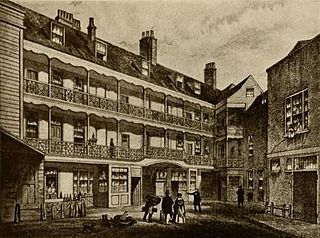This article needs additional citations for verification .(June 2015) |
| |||
|---|---|---|---|
| +... |
This article contains information about the literary events and publications of 1597.
This article needs additional citations for verification .(June 2015) |
| |||
|---|---|---|---|
| +... |
This article contains information about the literary events and publications of 1597.

English Renaissance theatre, also known as Renaissance English theatre and Elizabethan theatre, refers to the theatre of England between 1558 and 1642.
This article contains information about the literary events and publications of 1601.
This article presents lists of the literary events and publications in 1600.
This article contains information about the literary events and publications of 1596.
This article contains information about the literary events and publications of 1594.
Philip Henslowe was an Elizabethan theatrical entrepreneur and impresario. Henslowe's modern reputation rests on the survival of his diary, a primary source for information about the theatrical world of Renaissance London.

The Swan was a theatre in Southwark, London, England, built in 1595 on top of a previously standing structure, during the first half of William Shakespeare's career. It was the fifth in the series of large public playhouses of London, after James Burbage's The Theatre (1576) and Curtain (1577), the Newington Butts Theatre and Philip Henslowe's Rose (1587–88).

The Theatre was an Elizabethan playhouse in Shoreditch, just outside the City of London. Built in 1576, after the Red Lion, it was the first permanent theatre built exclusively for the showing of theatrical productions in England, and its first successful one. Actor-manager James Burbage built it near the family home in Holywell Street. The Theatre's history includes a number of important acting troupes including the Lord Chamberlain's Men, which employed Shakespeare as actor and playwright. After a dispute with the landlord, the theatre was dismantled and the timbers used in the construction of the Globe Theatre on Bankside.

Edward "Ned" Alleyn was an English actor who was a major figure of the Elizabethan theatre and founder of the College of God's Gift in Dulwich.

Sir John Oldcastle is an Elizabethan play about John Oldcastle, a controversial 14th-/15th-century rebel and Lollard who was seen by some of Shakespeare's contemporaries as a proto-Protestant martyr.
The Lord Chamberlain's Men was a company of actors, or a "playing company", for which William Shakespeare wrote during most of his career. Richard Burbage played most of the lead roles, including Hamlet, Othello, King Lear, and Macbeth. Formed at the end of a period of flux in the theatrical world of London, it had become, by 1603, one of the two leading companies of the city and was subsequently patronized by James I.
In Renaissance-era London, playing company was the usual term for a company of actors. These companies were organised around a group of ten or so shareholders, who performed in the plays but were also responsible for management. The sharers employed "hired men" – that is, the minor actors and the workers behind the scenes. The major companies were based at specific theatres in London; the most successful of them, William Shakespeare's company the King's Men, had the open-air Globe Theatre for summer seasons and the enclosed Blackfriars Theatre in the winters. The Admiral's Men occupied the Rose Theatre in the 1590s, and the Fortune Theatre in the early 17th century.
The Admiral's Men was a playing company or troupe of actors in the Elizabethan and Stuart eras. It is generally considered the second most important acting troupe of English Renaissance theatre.

Cuthbert Burbage was an English theatrical figure, son of James Burbage, builder of the Theatre in Shoreditch and elder brother of the actor Richard Burbage. From 1589 he was the owner of the ground lease of the Theatre. Best known for his central role in the construction of the Globe Theatre, he was for four decades a significant agent in the success and endurance of Shakespeare's company, the King's Men.
Lord Strange's Men was an Elizabethan playing company, comprising retainers of the household of Ferdinando Stanley, Lord Strange. They are best known in their final phase of activity in the late 1580s and early 1590s. After 25 September 1593, they were known as the Earl of Derby's Men, that being the date of Stanley's accession to his father's title.
The Lady Elizabeth's Men, or Princess Elizabeth's Men, was a company of actors in Jacobean London, formed under the patronage of King James I's daughter Princess Elizabeth. From 1618 on, the company was called The Queen of Bohemia's Men, after Elizabeth and her husband the Elector Palatine had their brief and disastrous flirtation with the crown of Bohemia.

William Sly was an actor in English Renaissance theatre, a colleague of William Shakespeare and Richard Burbage in the Lord Chamberlain's Men and the King's Men.
Francis Langley (1548–1602) was a theatre builder and theatrical producer in Elizabethan era London. After James Burbage and Philip Henslowe, Langley was the third significant entrepreneurial figure active at the height of the development of English Renaissance theatre.

In the historical era of English Renaissance drama, an Inn-yard theatre or Inn-theatre was a common inn with an inner courtyard with balconies that provided a venue for the presentation of stage plays.

Gabriel Spenser, also spelt Spencer, was an Elizabethan actor. He is best known for episodes of violence culminating in his death in a duel at the hands of the playwright Ben Jonson.